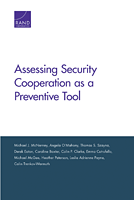| 来源类型 | Research Reports
|
| 规范类型 | 报告
|
| ISBN | 9780833081469
|
| 来源ID | RR-350-A
|
| Assessing Security Cooperation as a Preventive Tool |
| Michael J. McNerney; Angela O'Mahony; Thomas S. Szayna; Derek Eaton; Caroline Baxter; Colin P. Clarke; Emma Cutrufello; Michael McGee; Heather Peterson; Leslie Adrienne Payne; et al.
|
| 发表日期 | 2014
|
| 出版年 | 2014
|
| 页码 | 150
|
| 语种 | 英语
|
| 结论 |
On average, security cooperation has a statistically significant relationship with reduction in fragility.- The one-year effect was small, with most of the impact concentrated at the low end of expenditures per country, and there were diminishing returns from increased expenditures.
The correlation of security cooperation (SC) with reduction in fragility depended on the characteristics of the recipient country and the type of SC provided- SC was more highly coordinated with reduction in fragility in states with stronger state institutions and greater state capacity.
- SC was not correlated with reduction in fragility in states that were already experiencing extremely high fragility.
- SC was more highly correlated with reduction in fragility in more democratic regimes; the more democratic the regime, the greater the correlation of SC and reduction in fragility.
- The concentration of low state reach, authoritarian regimes, and relatively high levels of fragility in the Middle East and Africa meant that the positive correlation of SC and reduction in fragility was least pronounced in those regions; Latin America, Asia/Pacific, and Europe had the best effects.
- Nonmateriel and mission-specific aid — such as education and law enforcement, counterterrorism, and counternarcotics aid — were more highly correlated; aid provided through the equipment-focused Foreign Military Finance program, which forms the majority of U.S. security cooperation, was not correlated with reducing fragility in recipient countries. This outcome may stem from the fact that Foreign Military Financing aid is often focused on SC goals other than reducing state fragility, such as strengthening relationships, improving U.S. military access to a country, or improving capabilities for external defense.
|
| 主题 | Counterterrorism
; Global Security
; Peacekeeping and Stability Operations
; Security Cooperation
; United States
|
| URL | https://www.rand.org/pubs/research_reports/RR350.html
|
| 来源智库 | RAND Corporation (United States)
|
| 资源类型 | 智库出版物
|
| 条目标识符 | http://119.78.100.153/handle/2XGU8XDN/107646
|
推荐引用方式
GB/T 7714 |
Michael J. McNerney,Angela O'Mahony,Thomas S. Szayna,et al. Assessing Security Cooperation as a Preventive Tool. 2014.
|
|
文件名:
|
1404740233535.gif
|
|
格式:
|
GIF
|

|
文件名:
|
RAND_RR350.pdf
|
|
格式:
|
Adobe PDF
|
除非特别说明,本系统中所有内容都受版权保护,并保留所有权利。